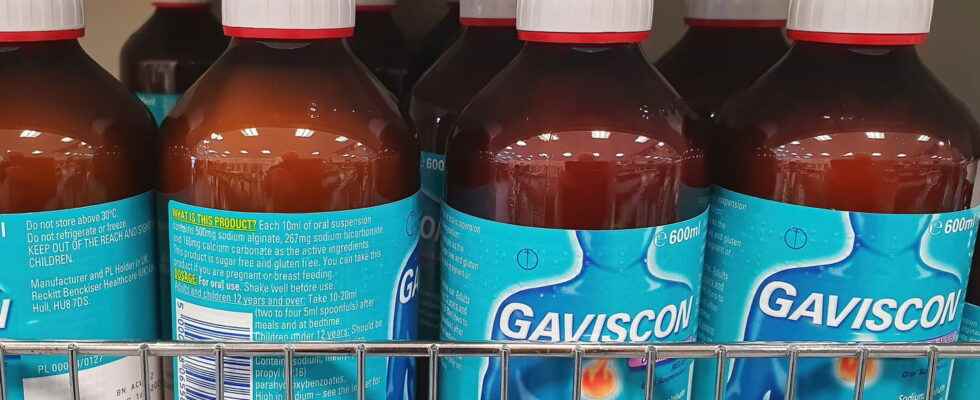Gaviscon® is a drug commonly used in children and adults, used as a local antacid against heartburn or acid regurgitation. It contains, among other things, sodium alginate which gives it its therapeutic properties.
What is sodium alginate?
Sodium alginate is a food additive (E401) from the alginate family, extracted from brown seaweed, which is found as a thickener in many drinks and foodstuffs. It comes in the form of white to creamy white powder, odorless and tasteless, very soluble in water. In the medical field, it is used in association with sodium bicarbonate in some antacid medications intended for the symptomatic treatment of gastroesophageal reflux (heartburn and acid reflux).
Under what name is it marketed?
Sodium alginate and sodium bicarbonate are the active ingredients of drugs Gavsicon® (existing in the form of an oral suspension in sachet-doses, in a bottle, or in the form of chewable tablets), Gavsiconell® (oral suspension in sachet-doses and chewable tablets), Gavisconpro® (oral suspension in single-dose sachets) and Maalox® reflux (oral suspension in sachet-doses). Sodium alginate/sodium bicarbonate is marketed as a generic of Gaviscon®, Gavisconell® or Gavisconpro® by various pharmaceutical companies (Arrow, Biogaran, Cristers, EG, Sandoz, Mylan, Viatris, Zentiva). Some specialties are advice forms, freely available in pharmacies.
What is its mode of action?
Sodium alginate acts by forming a viscous, foamy, light gel that floats in the stomach above the gastric contents and thus protects the esophagus during reflux. This freeze persists for 2 to 4 hours then is gradually eliminated during gastric emptying, without modifying the transit. In case of reflux, it neutralizes the acidity caused by gastric secretions along the upper digestive walls, while also having a mechanical role of anti-reflux protective barrier (its viscosity limits the number and duration of refluxes). Its pH being alkaline, it neutralizes the acidity of the gastric liquid at the level of the cardia (border between the stomach and the esophagus) without modifying the pH in the rest of the stomach, this acidity being necessary for the proper functioning of the stomach to allow digestion.
What are the indications for sodium alginate?
The sodium alginate/sodium bicarbonate combination is recommended for the treatment of gastroesophageal reflux disease resulting in heartburn, acid reflux or reflux or even heartburn (during gastroesophageal pathology, pregnancy, etc.).
Starting at what age ?
Sodium alginate can be used in infants from birth, children and adults, depending on the appropriate drug format. The use in children of under 12 should only be done on medical advice.
In adults and children over 12 years of age, the usual dose is taken 3 times a day, after the 3 main meals, and possibly an additional dose at bedtime. This dosage can be doubled in the event of severe reflux or oesophageal inflammation, on medical advice. In infants and children under 12 years of age, the dosage and duration of treatment should be determined by the doctor. In all cases, in children as in adults, a lack of improvement in symptoms after 7 days should lead to a reassessment of the situation.
To be taken at a distance (2 hours before or 2 hours after) other medications
Prolonged use without medical advice is not recommended because it could delay the diagnosis of a potentially serious digestive pathology. This medication is taken orally only, after meals, and should not be mixed with food or milk. Sodium alginate/sodium bicarbonate requires mixing the sachets well or shaking the bottle well before use. The tablets need to be chewed well before being swallowed. Also, this drug is to be taken at a distance (2 hours before or 2 hours after) other medications because it can alter their effectiveness. Vigilance is required when taking foodstuffs containing thickeners or sodium alginate because of the risk of exceeding the recommended daily doses. The risks associated with an overdose of sodium alginate may include: gastrointestinal discomfort or even the formation of a mass in the stomach (bezoar). The vials, once opened, are to be used within 30 days (infant vials) or within 3 months (children/adult vials), at room temperature.
Is it available with or without a prescription?
Sodium alginate/sodium bicarbonate is an over-the-counter (unlisted) drug, and so available without a prescription.
What are the side effects of sodium alginate?
Adverse effects of sodium alginate/sodium bicarbonate are very rare and are of the respiratory (spasms of the bronchi) or allergic (urticaria, anaphylactic shock).
Sodium alginate should not be used in children with kidney dysfunction
What are the contraindications of sodium alginate?
This medication is contraindicated in case of hypersensitivity to one of the constituents. Allergic reactions have been reported with mainly skin irritations and breathing difficulties. Sodium alginate/sodium bicarbonate should also not be used in children with kidney dysfunction known or supposed because of the risk of hyponatremia that this could cause (insufficient blood sodium level).
